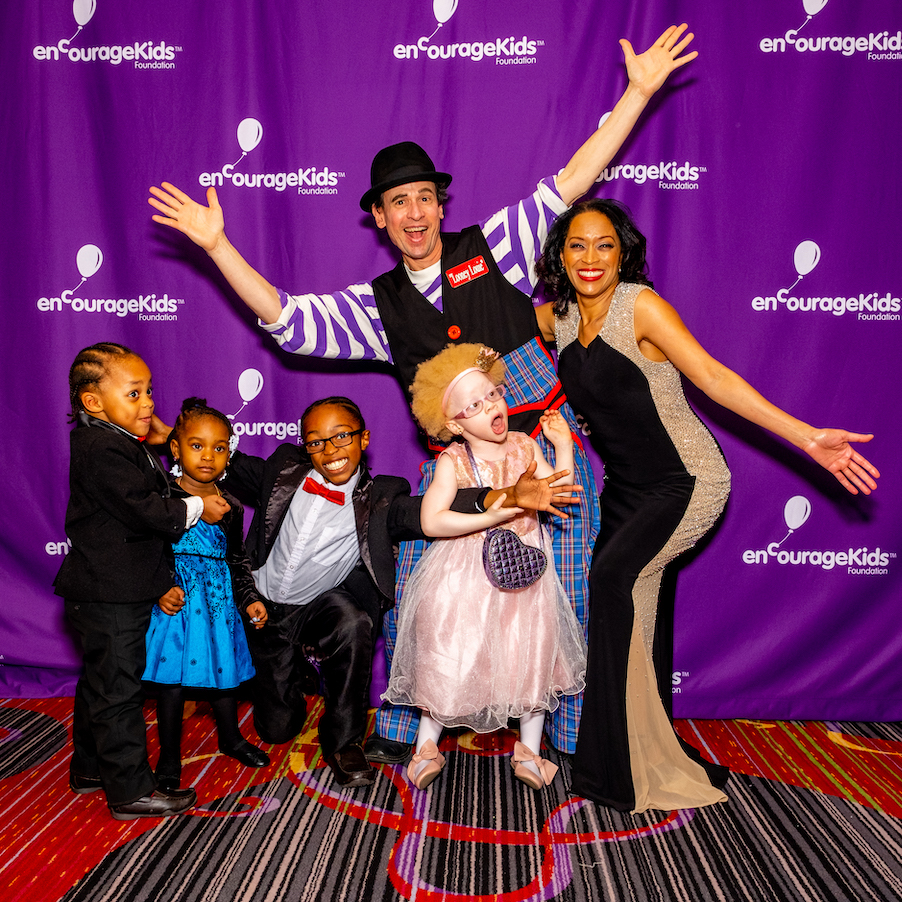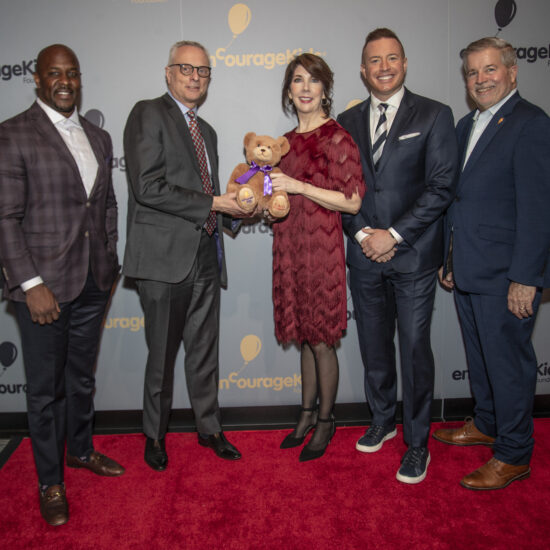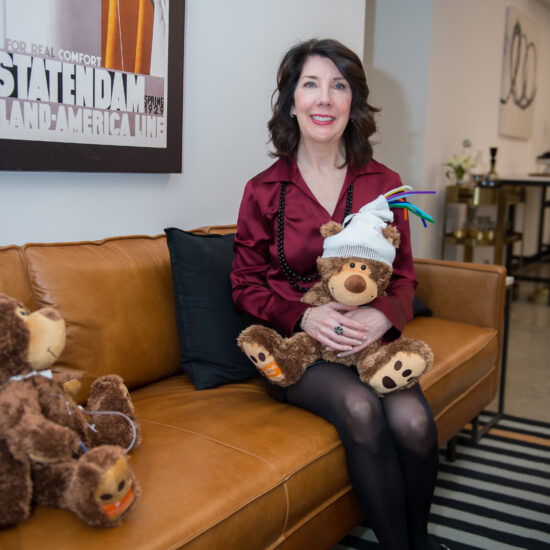February marks Black History Month. Black History Month is an annual celebration of achievements by African Americans and a time for recognizing the central role of blacks in U.S. history. Also known as African American History Month, the event grew out of “Negro History Week,” the brainchild of noted historian Carter G. Woodson and other prominent African Americans. Since 1976, every U.S. president has officially designated the month of February as Black History Month.
I had the opportunity to sit down and interview a fearless, intelligent and quite beautiful lady also known as Michele Hall Duncan. Michele is the President & CEO of the encourage Kids foundation and is making things happen! Celebrating its 35th year, the enCourage Kids Foundation helps humanize healthcare for children and their families by resourcing impact-driven pediatric programs and supporting the Child Life Community.
IR: Talk a little bit about your background. Where are you from? Were there any leaders/mentors in your family who you were exposed to at an early age?
MHD: My mother had me when she was very young. I was raised by my grandmother as well as my mother, and two aunts – one younger than my mother and one older. These were women who were just starting or had just graduated college, and so my house was filled with the intellectual energy of a bunch of college students at its best and its worst. Even if I didn’t understand most of it at the time, there was a certain magic to growing up in a house where you never knew what the dinner conversation would be, Urban Planning? Social justice? Economics? Boys?
I think growing up with role models who were younger women gifted me with an image of womanhood that was extremely dynamic. The women role models in my life were never just one thing to me, and they became multiple things across the span of my childhood. I was the daughter, the niece, the confidante.
I grew up in Flint Michigan, which at the time was a thriving mid-western town that was bountifully sustained by the auto industry before its decline. I went to well-funded public schools often staffed with black teachers and black administrators. I attended a public college, with an adequate representation of black students. It’s amazing to reflect on now, because raising black children today, especially in a major city often means choosing between schools that offer the diversity your child deserves or the opportunities that all children deserve.
Class stratification among the black community was not as pronounced at it is now so the local doctors and teachers and auto workers could all live in the same neighborhood and their kids could play together. When I was five, my pediatrician, dentist and kindergarten teacher were all black. It is not lost on me that those roles models shaped who I thought that I could become. Flint was in a way a role model for me, a living breathing network of hardworking honest people who created and sustained great lives for their families.
IR: What do you think about when you hear “Black History Month?”
MHD: Every night before I go to sleep, I take a few dietary supplements. These supplements are meant to support my body with nutrients I should be getting naturally in my diet, but don’t, at least not with the regularity that I should. I think of Black History Month in very similar terms, supplementing us with a shot of the knowledge and perspectives that we would ideally be exposed to on a regular basis. History is extremely intersectional and the same events can have wildly different meanings for different groups of people. The G.I. Bill for example was one of the greatest wealth building initiatives the United States has ever seen and is largely responsible for creating a robust middle class. On the other hand, it also excluded veterans of color making it arguably an even greater contributor to the black/white wealth gap than slavery.
There is a troubling habit of teaching and processing history in a way that isn’t very brave. This means that different communities of people cannot properly grapple with the fall out of that history because they don’t have a base reality. Black History is American History.
IR: Is there a specific black woman from history who inspires you?
MHD: Madame CJ Walker has always inspired me. Born only four years after the emancipation proclamation was signed, her story represents an incredible triumph over the social and structural barriers that women and people of color have faced historically. Instead of spending her entire life suffering under the weight of the politics of her hair, she thought of a way to make them work for her and thousands of other women. She built and empire that paved the way for other women to earn a living, provided her with great wealth and the ability to become an impactful philanthropist.
IR: What about a black woman from today?
MHD: Oprah Winfrey has an incredible story. She survived poverty, discrimination and sexual violence to go on to create an entire career out of encouraging people to share and heal from trauma. To have churned butter as a small child and been told that her highest aspiration should be that of a domestic worker, is unfathomable. She, just like Madam C.J. Walker, is also a formidable philanthropist.
IR: What does being a black woman mean to you?
MHD: There’s an extraordinary feeling of peace that comes from knowing that you are the descendant of a tribe of women who have overcome so much adversity. I am living during the best time in the history of our country to be a black woman. I draw strength from the black women who have preceded me and try my best to mentor young black women and (and young women broadly) wherever I can. My maternal and paternal grandmothers worked so hard during their lifetime, yet still dreamed of an extraordinary life for me. I hope that they would be proud of who I have become, and that I represent their legacy well. It has taken me a long time to accept the fact that as a CEO, I can represent something positive to both women and communities of color.
IR: What role do you think black women have played in history?
MHD: Wherever black women have gone, we have sustained life. I think when looking back on black women throughout history (including Africa and the diaspora) it’s easy to become overwhelmed by the waves of indignity and suffering that black women have been forced to endure.
There are entire genres of music, dance, art mediums, philosophies, words and cuisines that were born out the black women’s incessant insistence on creating wonder and beauty and joy from the raw materials of despair – and rarely ever being honored for her work. We all know Martin Luther King’s name, but we almost never here about the women who pulled of the logistical miracles that were the marches and rallies of the civil rights movement.
Even when we discuss figures like Rosa Parks, we make them seem tame and small. Rosa Parks is often depicted as an old lady who simply refused to give up her seat on a bus, against the backdrop of an otherwise ordinary life. But this is not true. Rosa Parks was in her early forties when she refused to give up her seat, she was full of energy and life and rage. She travelled all across the deep south investigating the rapes of black women. She was not a cute old lady. She was a force to be reckoned with, doing work so scary that it was beyond the capacity of most men.
Being a black woman for me is about taking whatever you are given and turning it into magic.
IR: Were you always interested in being a CEO of a nonprofit? If so, what made you come to that decision.
MHD: When I was a kid growing up in Flint, Michigan, I wanted to be a lawyer. I had my heart set on attending New York University and then moving on to a top law school. My family, however, wasn’t supportive of the idea. I was living with my aunt at the time, and NYU was simply financially out of my reach. As a freshman at Michigan State University, I initially majored in political science and then changed my major to advertising when studying Hobbes and Locke became unbearable. I did finally make it to New York, after falling in love with a boy from Jersey City and moving to the east coast after we were married. My first jobs at a direct marketing agency and a public relations firm were exciting, however I wasn’t passionate about the work. My son was a little over a year old when I decided to start volunteering at a children’s charity. I loved being a volunteer and feeling like such an integral part of fulfilling the mission of helping sick kids. I was volunteering for the foundation for about four years when the division of the company I was working for was sold to a competitor. My choices were to move to the company’s headquarters in Dallas or take the severance package and move on. I didn’t want to uproot my husband and young son, and I really loved the energy of New York City, so I decided to stay. During that downtime, I began to volunteer at the enCourage Kids Foundation’s office more frequently, while I plotted my next career move. When one of the full time staff went on maternity leave, I was asked to step in for her temporarily; that was 24 years ago. That is called serendipity.
IR: What are you working on right now?
MHD: I am working on expanding the mission of enCourage Kids Foundation in every way possible. We are celebrating our 35th Anniversary Gala and planning an amazing celebration on March 11th at Cipriani Wall Street. My goal for 2020 is to engage as many people as I can with this incredible mission.
IR: What would you say to your teenage self?
MHD: I would tell her to find the people who believe in her – even if they’re not what she envisioned or expected. Throughout my life, I have been at times tragically disappointed by the limitations of people who loved me deeply and truly surprised at the doors that people have opened for me based on what they gleaned of my potential from a single conversation. One of the most difficult things in the world to do is to resist the urge to try to control what direction the wind in your sail will come from. I would tell my teenage self to honor and internalize support and affirmation from every possible source without doubt or hesitation. And I would tell that young woman to love and believe in herself beyond measure.
IR: Thank you so much Michele for sharing your personal and profound journey with us. I look forward to seeing you next month to celebrate the 35th Anniversary of the enCourage Kids foundation. Congratulations!
MHD: It is my pleasure and I look forward to seeing you there.
For more information and purchase tickets to the upcoming 35th Anniversary Gala, please visit: www.encourage-kids.org.



